At contentious Statehouse panel, Abenaki leaders urge lawmakers to reconsider recognition of Vermont groups
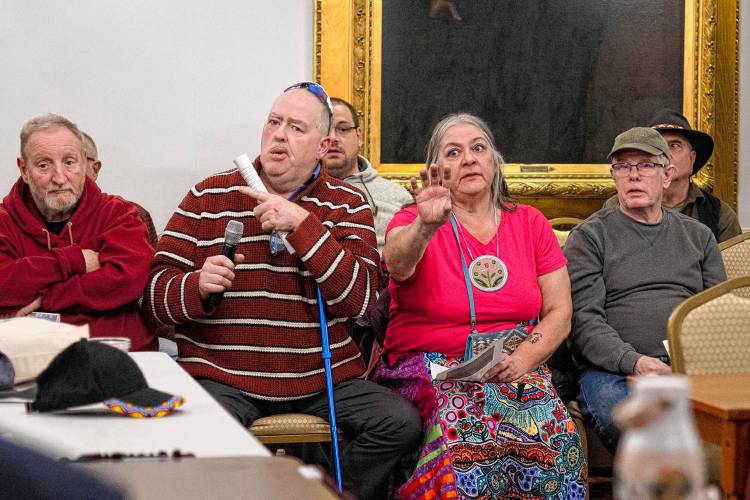
Supporters of Vermont's Abenaki tribes interject during a public meeting on the recognition of the state's tribes at the Statehouse in Montpelier, Vt., on Wednesday, February 19, 2025. (VtDigger - Glenn Russell) Glenn Russell—Glenn Russell
| Published: 02-24-2025 5:02 PM |
MONTPELIER — Rep. Troy Headrick, I-Burlington, posed a question in a recent flyer sent to his colleagues in the Vermont House and Senate: “What if we got it wrong?”
He was referring to state lawmakers’ decisions, well over a decade ago, to recognize four groups in Vermont as Abenaki.
On Wednesday, Headrick hosted a panel at the Statehouse with Abenaki leaders from a First Nation centered in Quebec who responded to the Burlington lawmaker’s question with an emphatic yes — legislators did, in fact, get the process wrong.
“This evidence stands up,” Headrick said in an interview, speaking about Odanak First Nation’s assertions. “We have to ask this question — even if it’s uncomfortable.”
The evening panel, which also featured a group of scholars of Indigenous history and identity, was remarkable as much for its setting as for how contentious it quickly became. Some 100 people had packed into the room at the start of the event.
Odanak leaders have maintained for years that many members of Vermont’s four state-recognized tribes are not Indigenous and, instead, are appropriating Abenaki identity in ways that harm their band members. The leaders say they were largely shut out of the debate over whether to recognize the four groups, a process they also say was based on insufficient proof that the groups seeking recognition were Abenaki.
Research from scholars, including those who spoke Wednesday — as well as reports from the Vermont and U.S. governments — have concluded that there is little evidence to support the existence of Abenaki tribes in Vermont with ties to historic groups.
The First Nation has made its case ever-more-forcefully over the past three years, at the same time drawing sharp rebukes from leaders of the Vermont groups, who have moved to, as they tell it, defend their culture from attacks levied by a former ally.
Article continues after...
Yesterday's Most Read Articles
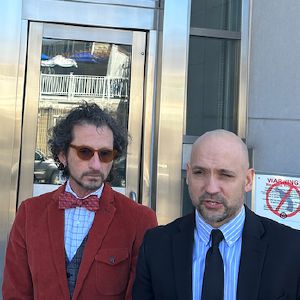 Federal judge temporarily reinstates legal status for Dartmouth graduate student
Federal judge temporarily reinstates legal status for Dartmouth graduate student
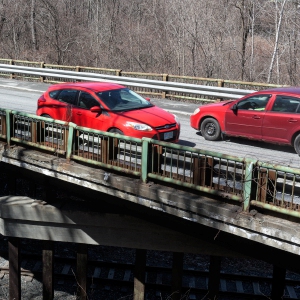 West Lebanon bridge reopens to vehicles
West Lebanon bridge reopens to vehicles
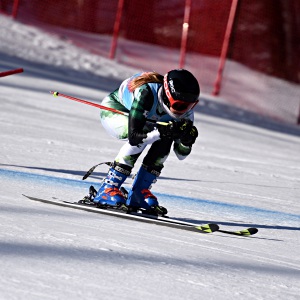 Former Dartmouth ski team member dies in accident in California
Former Dartmouth ski team member dies in accident in California
 Upper Valley Tesla owners among those rethinking their purchases
Upper Valley Tesla owners among those rethinking their purchases
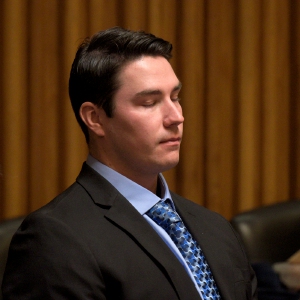 Prosecutors seek prison term of at least 30 years for man convicted at Dartmouth rape trial
Prosecutors seek prison term of at least 30 years for man convicted at Dartmouth rape trial
 Upper Valley donut maven Muriel Maville dies at 87
Upper Valley donut maven Muriel Maville dies at 87
Those groups, based throughout Vermont, are the Elnu Abenaki, Nulhegan Abenaki, Koasek Band of the Koas Abenaki Nation and the Abenaki Nation at Missisquoi.
Odanak leaders have called for support at forums at the University of Vermont and, last year, at a United Nations conference in New York City on global Indigenous issues. On Wednesday, though, the leaders spoke in the very building where the process they have challenged took place — and to some of the only people who have the authority to, as the First Nation has repeatedly asked, reconsider the state’s past tribal recognitions.
VtDigger counted some 20 House or Senate members in the audience for at least parts of the two-hour event. Lt. Gov. John Rodgers, the state’s second-highest ranking official, also attended.
“You were misled,” said Jacques Watso, who is one of Odanak’s tribal councilors, in his remarks. “Individuals and groups without legitimacy have manipulated history, told falsehoods and taken advantage of the lack of rigorous verification to obtain recognition that does not belong to them. It is time to correct the error.”
In addition to Odanak band members, the panel featured David Massell, a history professor at UVM who helped organize the recent forums with Odanak leaders at the university; Richard Witting, a researcher who has studied Abenaki history and eugenics in the state; and Darryl Leroux, a University of Ottawa associate professor who has published peer-reviewed research that supports Odanak First Nation’s assertions.
Among the audience were leaders of the state-recognized groups and numerous others who were either members of the groups, or were there supporting them. At times members of the audience shouted over the panelists, accusing them of telling lies.
Don Stevens, chief of the Nulhegan group, was sitting in the front row of the audience facing the panelists and, at one point, called one of the speakers “pretty arrogant.”
“Don’t take away our lived experience because you want to claim sole authority of it,” he said.
The event also included a question and answer session that at times devolved into terse arguments between panelists and the crowd. Many of the audience’s questions were, effectively, ad hominem criticisms of the panelists’ identities or their qualifications.
Some audience members’ comments seemed to share anti-Canadian sentiment, with one man shouting “make Canada the 51st state!” as he walked out of the room.
One pointed exchange came between Watso and Rich Holschuh, a former chair of the state’s Commission on Native American Affairs who is a member of the Elnu group.
“I’m looking at you, Mr. Watso,” Holschuh told the councilor. “I am related to you.”
“Rich — you’re not,” Watso replied, appearing almost to laugh.
In an interview afterwards, Headrick said he was expecting the event to be emotionally charged, but found some of the discussion to be “extremely unfortunate.” He doesn’t think that there is compelling evidence to refute the Odanak leaders, he said.
“So, what you’re left with is an emotional response,” he continued. “Which is understandable.”
Headrick said his goal with Wednesday’s event was to start what’s likely to be a lengthy process of “repairing” harm that Odanak First Nation leaders say the state’s tribal recognition process has caused them and their band members.
Now, he’s set to introduce a bill that would, among other measures, establish a task force to “review the validity” of the state’s past tribal recognitions — and determine whether any should be rescinded. The task force would include band members from Odanak and its sister community, W8linak First Nation, as well as legislators, experts on genealogical research and an official from the Vermont Attorney General’s Office.
The bill would also revise the state’s standards used to review applications for tribal recognition, including new language requiring “input from federally or internationally recognized Indigenous communities,” which would include Odanak and W8linak.
Some people affiliated with Odanak testified to Vermont legislators during hearings for the state recognition process, though lawmakers at the time required those who spoke to be from Vermont. That meant others from Odanak who wanted to participate were shut out, leaders from the First Nation have recounted at forums in recent years.
According to the state’s current tribal recognition standards, a group has to show that “a substantial number” of its members “are related to each other by kinship and trace their ancestry to a kinship group through genealogy or other methods.”
That’s a different — and less stringent — standard than the U.S. federal government’s recognition requirements, which provide that, among other stipulations, an applicant must have been identified as Native American “on a substantially continuous basis since 1900.” Odanak and W8linak have similar federal recognition in Canada.
One of the Vermont groups — the Missisquoi — applied for federal recognition in the U.S. in the 1980s. But in 2007, the federal Bureau of Indian Affairs, which is tasked with adjudicating those applications, denied the group’s request, finding that less than 1% of its members at the time could show descent from an Abenaki ancestor.
More recently, Odanak leaders have also turned their attention to Vermont’s Truth and Reconciliation Commission, which is the panel tasked with studying the impacts of racism, discrimination and eugenics throughout state history on certain groups of people.
Among those groups, according to the commission’s charge, are people “who identify as Native American or Indigenous.” That has sparked criticism from Odanak leaders, who say it’s led the panel to tie at least part of its work to groups that, according to the First Nation, “identify” as Indigenous but can’t claim legitimate Indigenous ancestry.
Odanak leaders have also taken issue with how one of the commission’s leaders is a member of one of the state-recognized groups.
Headrick’s bill seeks to respond to those concerns, too, he said. It would stand up an “oversight committee” of legislators who would monitor the Truth and Reconciliation Commission’s actions, according to the bill. It would also require the Vermont State Auditor to review the commission’s work for “potential biases and exclusion of key voices,” among other measures.
The commission did not respond to a request for comment Thursday afternoon about the proposals in the legislation.
Headrick is seeking cosponsors on his bill this week, he said, and expects that it would be introduced on the House floor next week.
Meanwhile, Odanak and W8linak’s tribal governments celebrated the proposed legislation in a statement Thursday morning, calling it “a crucial step in rectifying past wrongs and ensuring a thorough reconciliation process.”






 Upper Valley businesses feel the sting of rising cocoa prices
Upper Valley businesses feel the sting of rising cocoa prices New Hampshire House passes slimmed-down budget, as Ayotte vows to restore some cuts
New Hampshire House passes slimmed-down budget, as Ayotte vows to restore some cuts Board schedules revote on bond for Bethel and Royalton schools
Board schedules revote on bond for Bethel and Royalton schools
